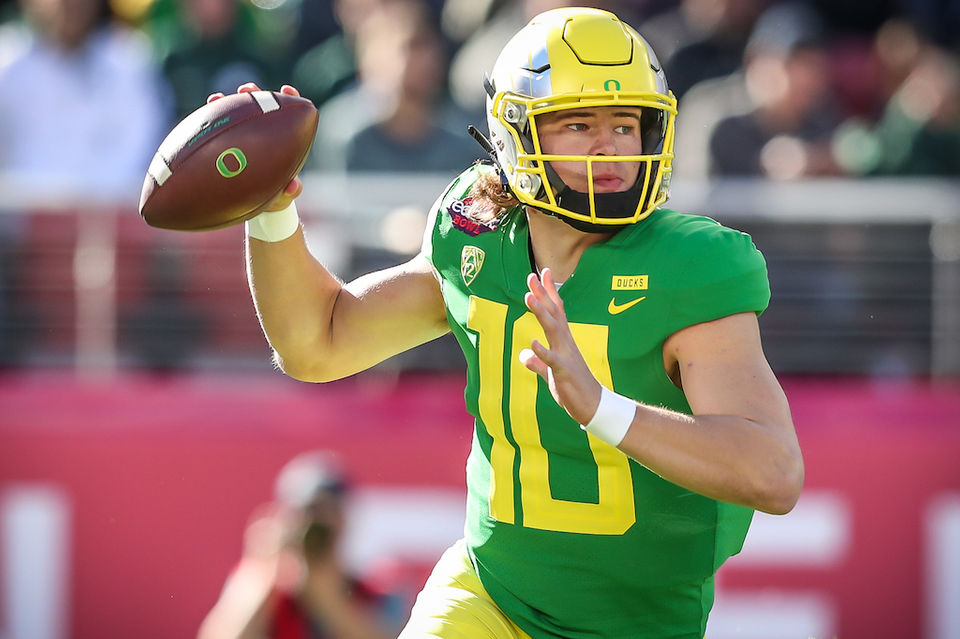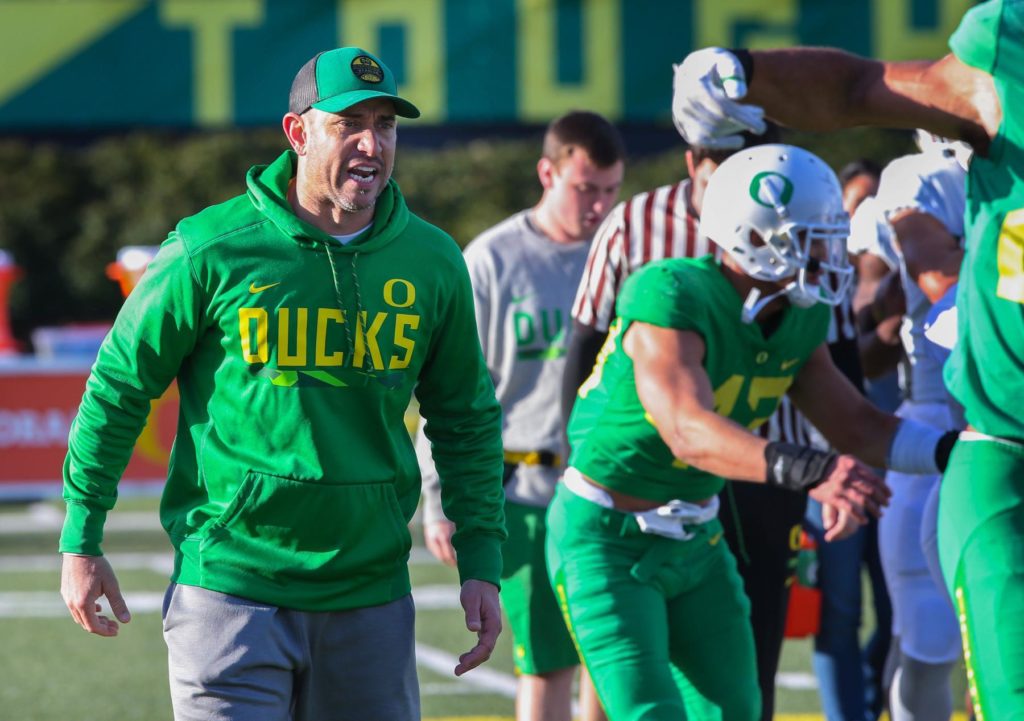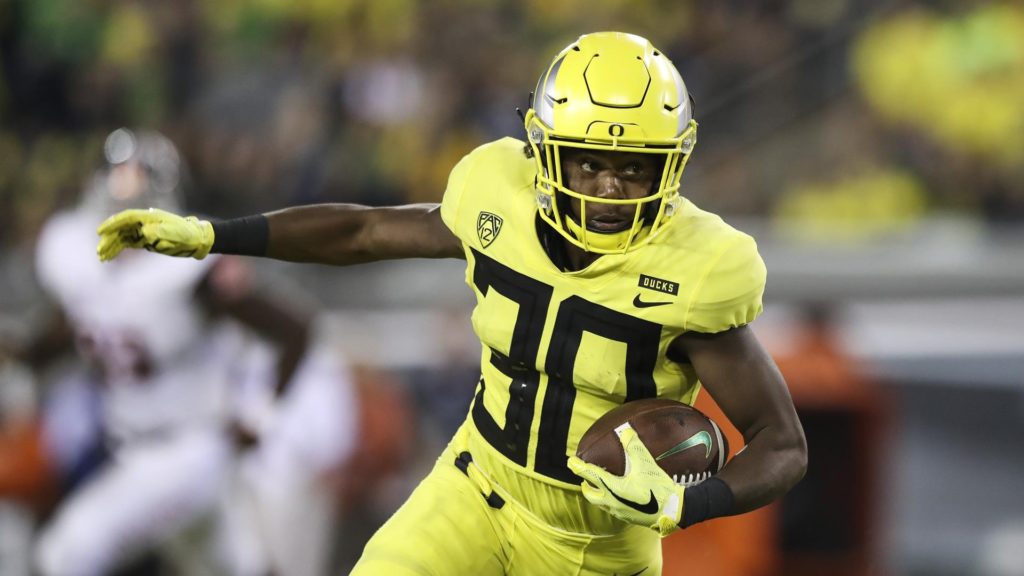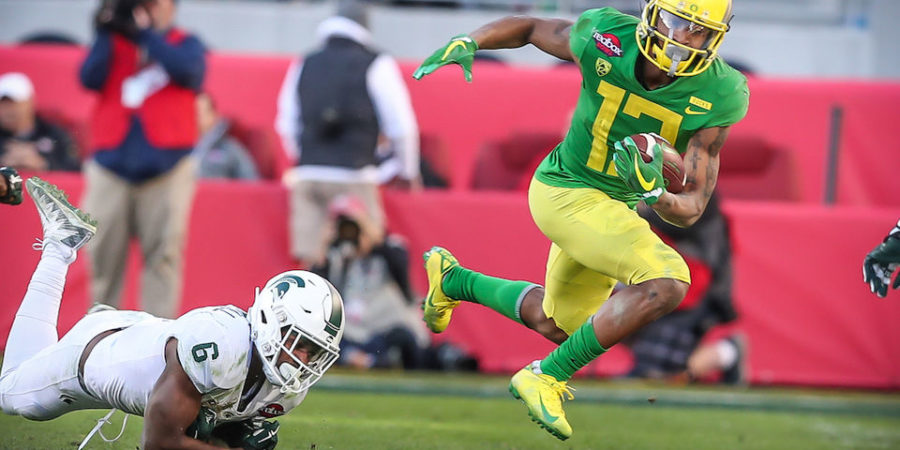After securing its first bowl victory since 2015, in addition to its first nine-win season since the same calendar year, the Oregon football program was hit with a sobering dose of reality just two days into 2019.
On Wednesday, Ducks junior wide receiver Dillon Mitchell announced he would be foregoing his senior season at Oregon to enter the NFL Draft in late April.
— Dillon Mitchell (@DMFM1_) January 2, 2019
With Mitchell’s departure, the Ducks lose a player who accounted for more than 30 percent of the team’s receptions, more than 36 percent of its receiving yards, and more than 34 percent of its receiving touchdowns. In short, losing Mitchell is a devastating blow to an offense that already has its fair share of questions heading into 2019 despite the prospective return of quarterback Justin Herbert and a host of experienced offensive linemen.
Below, WFOD analyzes the loss of Mitchell and what it means for Herbert, offensive coordinator Marcus Arroyo, and the Oregon wide receiver room as it’s currently constituted.

What Dillon Mitchell’s departure means for Justin Herbert
You think Oregon’s senior signal-caller-to-be is having second thoughts about his decision to return to school next season? In all honestly, probably not, since Herbert stated after the bowl game that he never really considered declaring for the draft following the season. However, though Herbert’s decision was made independent of Mitchell’s, the loss of the player who was far and away his most preferred and productive target has to fill Herbert with some level of trepidation heading into a 2019 campaign that comes with legit Pac-12 title aspirations.
Already tabbed as perhaps best pro prospect at the quarterback position in college football, the pressure that was already on Herbert to deliver next season has now increased exponentially, as he’ll be largely responsible for shepherding a receiver group that woefully lacks proven playmakers minus Mitchell. The question now is whether Herbert can make his teammates better. There’s no doubt that Herbert has the experience and the physical gifts to be that player, but there is little evidence to support the notion that he is adept at elevating the play of those around him.
Outside of Mitchell, Herbert has yet to prove he’s capable of establishing a consistent and threatening connection with any receiver on the roster the past two seasons. This season there were numerous examples of Herbert locking on and forcing the ball to his all-conference caliber receiver, failing to go through his progressions and see the entire field and all of his options as a play developed. In 2019, he won’t have that luxury. Certainly there’s an argument to be made that Herbert’s lackluster supporting cast of skilled position talent gave him few options, but he will need to demonstrate definitive growth in this area if the Ducks are to achieve their 2019 goals. And while the Ducks will receive an infusion of young talent from their 2019 recruiting class, it’s hard to imagine the Oregon passing game not taking a step back in Mitchell’s absence. Having Herbert in the fold is obviously better than not having him at all, but without Mitchell, it’s entirely possibly that the offensive struggles the Ducks endured in 2018 could be exacerbated to an even greater degree should Herbert fail to elevate his game to an even greater level.

What Dillon Mitchell’s departure means for Marcus Arroyo
If Oregon offensive coordinator Marcus Arroyo thought sledding was tough this past season, he could be in for an even ruder awakening in 2019. For him, the raw offensive materials are more or less the same as they were in 2018. Arroyo has an All-American caliber quarterback, a skilled and experienced offensive line, a stable of running backs with intriguing potential, and a wide receiver group that’s in desperate need of leader to emerge. This past season, Mitchell was the obvious person to fill that leadership role amongst the wide receiver group. Now that he’s gone, there are no obvious answers as to who fills that void.
Even with Mitchell, Arroyo and the Oregon offense regularly found itself under fire from members of the media and fans due to its play. And justifiably so. Not only did the Ducks post their lowest yards per game average in terms of rushing offense (179.38 yards/game) since 2005, but the offense as a whole was predictable and wildly inconsistent from game-to-game, and often from half-to-half. Of course, some of that has to do with the glaring lack of talent and experience at the skilled positions, but the lack of ingenuity and adaptation to the talent on the roster was a concerning trend throughout the year. Furthermore, one would be hard pressed to name a skilled position player – particularly at receiver – who made notable strides in their development over the course of the season. That has to change, along with some tweaks to the offense, next season.
All in all, Mitchell’s presence only partially masked some of Oregon’s offensive deficiencies. Without him, all of its warts are now bared. It’s too early to say that Arroyo is on the hot seat, but combine the overall performance of the past season with a potential dud performance in the 2019 season opener versus Auburn in Jerry World, and it’s easy to see how things could get appreciably dicier for the 38-year-old assistant.

What Dillon Mitchell’s departure means for Oregon’s wide receiver room
With Dillon Mitchell, the Ducks had a prime opportunity to reclaim the Pac-12’s North division. Without him, that quest becomes much more difficult as the Oregon passing game will now rely on a collection of players who have inspired little confidence to date. Of the Ducks’ returning options at the position, the player with perhaps the most upside is junior-to-be Jaylon Redd. At 5-foot-8 and 178 pounds, Redd is not your prototypical go-to receiver, but he is the receiver with the most game-breaking ability operating out of the slot. His 43 career receptions and six receiving touchdowns leads all returning Oregon wide receivers, but he’s far more effective as a complementary piece than as the passing game’s no. 1 option. Johnny Johnson and Brenden Schooler have 514 and 477 receiving yards for their careers, respectively, but neither player has proven capable of carrying the weight of the Oregon passing attack. Though both players possess more prototypical size and ability compared to Redd, both players have also struggled mightily with drops over their careers and were essentially non-factors within the offense this season.
Bryan Addison, Daewood Davis, JJ Tucker, Demetri Burch, Isaah Crocker, and Justin Collins are underclassmen who have shown some ability in practice, but none have yet to make a significant impact in a game. In fact, between the six of them, they have combined for three catches for 47 yards for their careers. However, if you’re looking for a potential savior from this group, Addison may be your best bet. A highly-touted four-star recruit coming out of high school, the 6-foot-5, 180-pound athlete has the size and athleticism to blossom into a potential star. A midseason suspension curtailed his development some, but he was player that was pushing hard for playing time at the end of the season and who could be popular breakout candidate next fall.
It’s possible that Oregon’s hopes and dreams on offense will rest in the hands of four highly regarded incoming freshmen who will be given every opportunity to see the field next season. Mycah Pittman, Josh Delgado, and Lance Wilhoite are four-star recruits who had offers from programs from coast-to-coast, while three-star prospect JR Waters was a late bloomer who garnered interest from Michigan, Nebraska, and Arizona State before pledging to the Ducks. Of the group, Pittman appears to the player who is most ready to contribute from Day 1, as his polished skill-set and tremendous playmaking ability sets him apart from most of his peers. However, keep a close eye on Waters, who at 6-foot-3 and 185 pounds has the size and athleticism to make instant impact when he arrives in Eugene.


Well, it seems someone has poisoned the well when it comes to Schooler. “Objectively”, my point is very simple. Here are facts, not opinions.
A. Schooler is 100%guaranteed not to catch every pass Herbert doesn’t throw to him. On those passes he will have no productivity.
B.”As we all saw” Schooler had minimal, if any drops if the ball was in his zip code; i.e. he was open in the end zone at the end of one of the tight losses, but Herbert totally missed him, was open and beating a MS dback in the Redbox Bowl waved his arm slowed up to be seen and still had to watch Herbert try to force it to Mitchell.
After a stellar freshman year at Safety Schooler showed enough development in 2017 to be able play well despite competing for reps behind scholarshipped and veteran receivers. He extended his development when assigned to special teams by receiving team and Pac-12 honors. Named first team for the second year. I know”it’s objectively hard to measure First team All Conference performance as a sign of growth or development, but it might indicate those attributes would be applied to any role he takes, especially wide receiver IF GIVEN A CHANCE.
He looked very good in the spring game and it looked like Coach Arroyo had another weapon to use.
I don’t understand your reluctance to recognize the reason Mitchell looks irreplaceable is that Herbert almost as if on a bias went only to him.
My point was and is if you’re painting a picture it might be more pleasing if you use all your colors. It might also show you to be less predictable. Just have an open mind.
Thanks for having an open forum where everyone has a chance to participate.
I’m glad you’re taking advantage of the open nature of this forum! The goal is to have a place where people can express their opinions intelligently and disagree with respect.
I see where you’re coming from with your argument, I just don’t think it’s very strong.
You’re right in that Schooler can’t catch passes if he isn’t getting looks, and yeah, Herbert has definitely had tunnel vision at times as a starting QB, which is something he’ll need to address moving forward. But to suggest that Herbert has some sort of underlying bias toward a player like Mitchell is a stretch. If Herbert is “biased,” it’s because he’s preferential to a guy who commanded attention by making the most of his opportunities. The QB’s job is to find the open man, and I can’t imagine Herbert really cares who it is as long as he can locate him, deliver him the football, and trust that he can make a play.
Mitchell, through his quality of play, earned Herbert’s trust, both games and practices. Specifically, Mitchell consistently got separation and made plays when the ball was thrown to him. No other receiver has done that with any measure of consistency, outside of maaaybe Jaylon Redd. This isn’t to slam Schooler (or Johnny Johnson, or Jake Breeland, or any other receiver on the roster), but the fact of the matter is that if Schooler (or anyone else) was proving day-in and day-out that they could be a relied upon weapon in this offense, they would be just that. Certainly Arroyo shoulders some of the blame here too, as the offense has been predictable as mentioned. But the bottom line is that Schooler isn’t and hasn’t done those things. And one could argue that if there were a year to do that, this past season would have been it considering how much attention Mitchell drew from opposing defenses. Schooler won’t have that luxury heading into the upcoming season.
Mind you, this isn’t an indictment of his work ethic or his want to be great. It just means it hasn’t happened yet and it’s objectively hard to imagine that it will happen based on what we’ve seen for now going on three years.
Spring practices will be interesting to monitor, and I hope for Schooler’s sake that he’s able to prove a lot of people wrong (myself included). He’ll have his chance no doubt, but I don’t see this as a case of Schooler being slighted in any way by Herbert or the offensive philosophy. I think he simply is what he is as a receiver, and for opinions to change, he’ll need to elevate his game in a significant way.
Upon further review…
https://wholeflockofducks.com/index.php/2018/08/08/at-wideout-the-difference-between-good-and-great-may-be-brenden-schooler/
Can we all say underutilized?
Lol, despite the link (which I appreciate, by the way!) I’m still not seeing your point…if anything, you’re reinforcing my position…
In that article I outlined reasons for why Schooler might be a guy who could take a leap this year. I suppose those sentiments still remain today, but as we all saw, after a full season (and offseason) at the position, there was little to no development to speak of. With that, it’s objectively hard to be overly optimistic about Schooler’s contributions looking forward.
Herbert no doubt had tunnel vision at times this year, but you could hardly blame him given the weapons at his disposal and the consistency they displayed when given their opportunities.
I’m not here to throw rocks at Mitchell. My point was he did his best and received the proper recognition. However, he is not irreplaceable. There are many tools left in the toolbox; maybe some need sharpening or better use, but the Ducks did not win the Pac 12 in 2018 because the offense was executed by being less than multi-dimensional rather than because Redd, Schooler, Johnson, Breeland or Bay didn’t show up or didn’t have skills as good as one other player.
In 2019 if the passing game uses all their weapons they should go a lot further.
I think that’s fair, but I also think that the reason why they weren’t utilized to a greater degree was because they proved over the course of a season that they simply could not be relied upon. Oregon was victimized by an alarming number of drops all season, and I think that has a lot to do with the erosion of Herbert and offensive brain trust’s confidence in those players you mentioned. Can they improve? Absolutely. But there was little to no development that took place at that position over the course of the season (excluding Redd).
Guys like Schooler, Johnson, Breeland, Bay, etc. may have been under utilized, but it’s not like they were commanding opportunities with their performance on the field this past season. Mitchell isn’t irreplaceable, but I think even the most optimistic Duck fan would admit that without Mitchell, they are appreciably worse off at that position entering 2019 than they were last season.
I beg to differ with your assessment of Brenden Schooler. Schooler has not struggled with drops. Schooler does not get throws. I recall one pass thrown his way in the Redbox bowl, somebody on the bench may have caught it it was so bad. Mitchell won’t be missed. When a player gets all the throws he should lead all the others.
Mitchell was not a good blocker. He merely pushes his assignments. Schooler always accounted for springing a back or other receiver.
As I recall Schooler was highly ranked on the speed list yet never given a long pass to show the speed. On special teams you could see it. Schooler has a great vertical leap and can high point the ball Mitchell had one go off his helmet.
Just saying.
Any assertion that Oregon won’t miss Dillon Mitchell next season is just a bad take. You don’t just lose far and away the best receiving threat on your team and expect be to be better the following season…particularly when you return what the Ducks figure to return at wide receiver in 2019.
You’re right when you say that Schooler hasn’t been featured much in this offense, but there’s a reason for that. You can have all the physical tools you want, but if you can’t apply them consistently, it’s going to be difficult to make an impact on the field, at least when you’re deployed as a receiver like he so often is.
Mitchell wasn’t/isn’t the complete package, but he was pretty darn good and was essentially everything for Justin Herbert and this offense through the air.
One can only assume Mark Helfrich would have steered the offense to significantly greater output… I saw nothing in Arroyos offense this year to lead me to believe he will be successful next season, so sad…